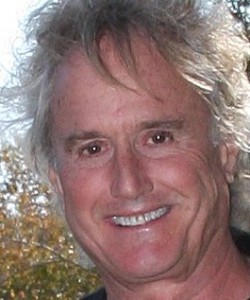Elected Without God: Interview with Dunedin City Commissioner Ron Barnette

In the United States Congress, there are zero – I repeat, zero – Senators or Representatives that identify as atheists or nontheists. Yes, it’s true that Rep. Krysten Sinema (AZ) admirably is the first member of Congress to write “none” next to “religious affiliation,” and even chose to be sworn in with a copy of the Constitution, but, after being identified as an atheist in the press, had her office release a statement saying “the terms non-theist, atheist or nonbeliever are not befitting of her life’s work or personal character.”
AHA Humanist of the Year and Darwin Day sponsor former Rep. Pete Stark (CA) is an open atheist, the first ever in Congress, but lost his seat in 2012 after serving the San Francisco Bay Area for twenty years due to redistricting.
Rumor has it, over two dozen current Senators and Representatives don’t believe in a god, but none are willing to go public. We sometimes only find out about an atheist politician when something goes wrong, like when opponents of Ashville, North Carolina City Council Member Cecil Bothwell tried to get him kicked out over an unlawful part of the state Constitution requiring belief in a god. (They failed and he’s still serving.)
Happily, an opportunity to interview nontheist Dunedin, Florida City Commissioner Ron Barnette came to HNN through friendly channels. Barnette, who has been serving since 2009, wrote the city’s Code of Core Values for Civility and Ethics, a set of self-enforced guidelines for elected officials meant “to assure public confidence in the integrity of local government and its effective and fair operation.” The interview, conducted via email, is below.
HNN: Can you explain your nontheistic worldview?
Barnette: As a Professor Emeritus of Philosophy, I have maintained for some 50 years a naturalistic philosophy worldview, based upon reason and physicalism, viz. the position that maintains that natural, physical explanations can account for all aspects of reality, without any recourse to the supernatural. Critical thinking, reason, evolution and scientific inquiry are the tools for understanding our world, including ourselves as conscious physical beings.
HNN: Do you identify as a humanist?
Barnette: While don’t use that term to identify myself — I tend to avoid labels — I clearly support humanism and its naturalistic world view.
HNN: I heard you studied under and are friends with Daniel Dennett, the philosopher and cognitive scientist who is considered one of the four horsemen of “New Atheism.” We also heard that you had a famous friend in your undergraduate philosophy program.
Barnette: Yes, Dan Dennett chaired my doctoral dissertation (and his first one, actually), Explanation of Human Action, at the University of California, Irvine, where I received a Ph.D. in 1972. Dan and I have remained friends ever since, and have enjoyed much time together as we share views on philosophy of mind and consciousness, evolutionary theory, a naturalistic world view, and a curiosity about the evolution of life and societal institutions. Dan is a brilliant man, and so down to earth (so to speak!). Remarkable for one who is probably the most renowned living American philosopher. I was most pleased to have assisted him a few years ago with his book Breaking the Spell: Religion as a Natural Phenomenon—I’m now smiling as I read his thoughtfully-inscribed thank-you note and acknowledgments in his gift copy. Dan and his wonderful wife Susan are dear friends indeed.
Oh, and my undergraduate friend and fellow philosophy major classmate with whom I have remained close all these years and who I will see next month as we catch up on recent goings-on? You mean that guy!? Steve Martin, of course!
HNN: As a retired philosophy professor, what made you decide to get into politics and run for city commissioner?
Barnette: I consider my role as city commissioner to be one of a citizen politician who attempts to bring to bear on city matters clarity of thinking, devoid of special interests, for the betterment of our community. I am not a career politician! I am simply a resident of our wonderful community of Dunedin, Florida, who works on behalf of our splendid quality of life and who listens to our residents’ concerns and vision. That’s why I ran for office in 2009 and how I continue to approach my ethical commitment to our community’s well-being.
HNN: Did your nontheism come into play at all with your election?
Barnette: No, as this was never an issue. Fortunately, Dunedin is a very progressive and open community.
HNN: Does it come into play with where you stand on the issues? If so, can you give a specific example?
Barnette: My naturalistic and humanistic worldviews are always integrated in my reflective judgments, I suppose. For instance, Dunedin passed a while back a city-wide policy protecting equal rights for the LGBT community, including sexual orientation in city matters. Happy to add, this policy decision was a unanimous one! And I must also add that had this matter been tied up with religious objections — which it was not — I would have felt compelled to speak out forcefully for the separation of church and state.
HNN: Why do you think there are so few nontheists, nonbelievers or humanists in politics? How do you think this can change?
Barnette: Well, I’m not sure that your claims are accurate. You might be correct, but I’m not aware of the sociological research data that would support them. That said, it is true that there’s far too much theistic and religious rhetoric espoused in politics, especially nationally and amongst States’ legislative bodies. Perhaps a renewed sense of how important human reason is, and the ability to think rationally and ethically actually is in the course of human lives, could help further a shift in political rhetoric away from the ever-increasing divisiveness amongst thinking humans. Who knows? A new-found expression of American Enlightenment would indeed be refreshing, wouldn’t it?
